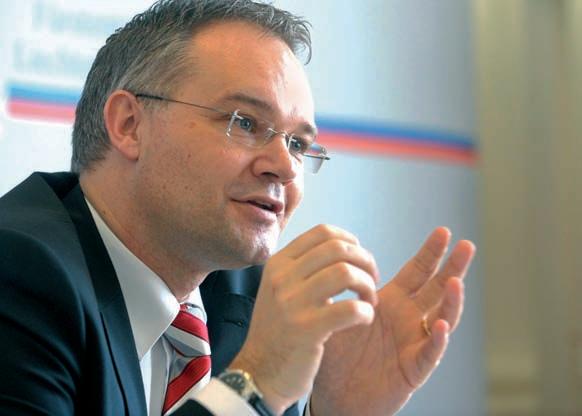
4 minute read
Open book
Open book Open book
Interview with Klaus Tschütscher Prime Minister of Liechtenstein
©Liechtenstein government
OECD Observer: A year ago Liechtenstein was in the glare of world media attention with accusations of widespread tax evasion, notably by Germans, using banks based in your country. Today, Liechtenstein is in the vanguard of international efforts to improve transparency and international co-operation in tax matters. How do you explain the turnaround?
Klaus Tschütscher: Setting world media attention for Liechtenstein aside, I believe we all agree that the world has changed quite dramatically over the past 12 months. Today, when implementing OECD standards, Liechtenstein is operating largely on an international “level-playing-field”. This is something we have consistently requested in order to move ahead with the development of our own financial centre.
Having said that, I should point out that our declaration on 12 March 2009 to commit to the OECD standards of information exchange in tax matters was in fact preceded by a transformation process that had begun many years earlier. In 2002 Liechtenstein had already concluded a mutual legal assistance treaty (MLAT) to combat tax fraud and the like with the US. This was followed by the implementation of the EU Savings Tax Directive by an agreement in 2005. Thereafter, Liechtenstein initiated negotiations to join the Schengen area which also foresees cross-border cooperation in the fight against fraud in direct and indirect taxes. As soon as Schengen is put into effect in Liechtenstein–hopefully by the end of 2009–its common rules will serve as a basis for comprehensive mutual legal assistance in cases of tax fraud.
At the national level, Liechtenstein relaxed the exemption in its Mutual Legal Assistance Act in 2007 so that assistance in cases of VAT tax fraud and for certain severe customs offenses is now permissible. Liechtenstein has been negotiating an Anti-Fraud Agreement with the EU for more than two years. After having substantially finalised these negotiations in June 2008, Liechtenstein offered to all EU member states to implement OECD standards by way of comprehensive bilateral double taxation agreements. This offer went largely unnoticed. Liechtenstein went ahead to conclude an OECD compliant Tax Information Exchange Agreement with the
CLEAN TAX AND TRANSPARENCY Liechtenstein Spotlight
US in December 2008. So what you see is not a turnaround but a step-by-step integration. This integration is the result of a sovereign political decision and yes, it is paced by the international efforts and progress in that area.
Liechtenstein is one of several financial jurisdictions to have signed up to the OECD global standards of transparency and exchange of information on tax in recent months. What concrete actions is Liechtenstein taking to honour that commitment and in particular to counteract non-compliance with foreign tax laws?
Our commitment stands and is an open invitation to other states to enter into agreements with Liechtenstein in order to implement these standards. We are currently in negotiations with Germany, the UK, Luxembourg and the EU. First contacts have taken place with France, the Netherlands, Belgium and also with other countries that have significant economic relationships with Liechtenstein. We are ready for a swift conclusion of these negotiations and the signing of agreements that will benefit Liechtenstein’s economy as a whole. Even though the financial industry, with a 30% share of GDP, is an important economic pillar in Liechtenstein, bear in mind that industry is the single largest contributor to our wealth, with an annual average of 40% of Liechtenstein’s GDP.
Are you confident that Liechtenstein’s financial industry can remain competitive in a more transparent global environment?
Yes, very much so. I will give you three reasons. First, our financial industry is prepared and has had time to adjust. It is ready for new business models. Already back in 2006 the government and business associations identified transparency and international cooperation in tax matters as a meta-trend likely to affect the traditional offshore business model. The government subsequently initiated a two-year consultation period that produced a report in February 2008 setting out the cornerstones of a repositioning of our financial centre. Second, our financial centre is well regulated and uniquely stable. After the global financial meltdown in 2008 and the systemic failures that were due to a lack of oversight, I believe that our proven stability will be a key element of competitiveness in the future. Third, co-operating internationally in the combat against tax fraud does not mean that Liechtenstein’s legal system no longer values the citizen’s right to privacy. Even with greater transparency and co-operation in tax matters, the right to privacy will remain a cornerstone of our legal system because it is part of our constitution and our culture. In an age when technology and politics are threatening personal privacy, we will keep it as a closely guarded asset that the client of the future will value.
References
Perez-Navarro, Grace (2008), “Tax, transparency and the global economy”, in
OECD Observer, No. 267, May-June 2008. Visit Liechtenstein's official website at www.llv.li








